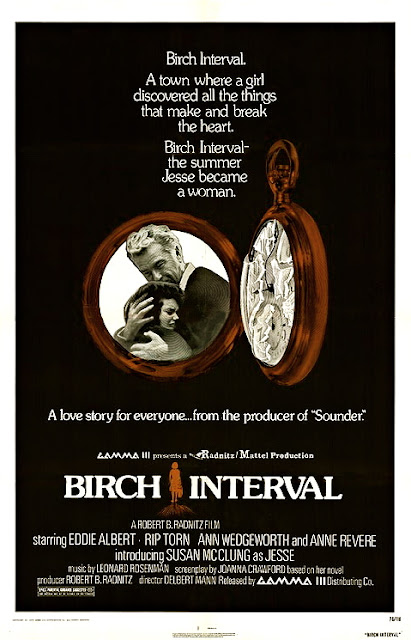A thoughtful coming-of-age story somewhat in
the vein of Harper Lee’s 1960 novel To
Kill a Mockingbird, Birch Interval has some
emotional moments and tender performances, even if the sum effect is
underwhelming thanks to an episodic storyline and a general lack of narrative
focus. Set in 1947, with events happening in and around the Amish country of
Pennsylvania, the movie was directed by the capable Delbert Mann, best known
for helming the Oscar-winning Marty (1955),
and Joanna Crawford adapted the screenplay from her own novel. Together, these
two did a fair job of blending nostalgic atmosphere, the experience of young
people discovering grim realities for the first time, and the sadness of
watching a loved one plagued by forces beyond his control. So even if Birch Interval fails to achieve all of
its goals, the fault does not stem from a lack of sincere effort.
The story
opens with young Jesse (Susan McClung) arriving for an extended visit with her beloved grandfather, Pa
Strawacher (Eddie Albert)' her eccentric uncle, Thomas (Rip Torn); Thomas’ wife, Marie (Ann Wedgeworth); and
Josh (Doug Fishel Jr.), Marie and Thomas' son. Problems
soon become apparent. Thomas’
behavior has become increasingly bizarre, even though he’s harmless;
he does things like climbing into trees when the mood strikes him. Marie has
lost her patience with her husband’s peculiarities, while Pa and Josh merely
fret about their inability to provide meaningful help. Woven though
this domestic material is an undercooked subplot about clashes between the
Amish and local authorities, who are tasked with enforcing rules requiring that
Amish children attend public school. In the same way that piece could have been
dropped from the picture with no ill effect, the filmmakers would have been
wise to strengthen Jesse’s story. She has some colorful and even harrowing
adventures, but she’s more like a witness than a protagonist.
Albert anchors the
movie well, personifying compassion and tolerance while also expressing the
helpless anguish of someone facing an impossible decision—specifically, whether
to have his own son committed. Yet the only reason Torn doesn’t steal the picture is that, like his character, he disappears for long periods
of screen time. He’s arresting when he's present, missed when he’s not. In
the crucial leading role, young McClurg does earnest work, conveying
bewilderment in some scenes and a kind of righteous indignation in others.
Birch
Interval: FUNKY


No comments:
Post a Comment